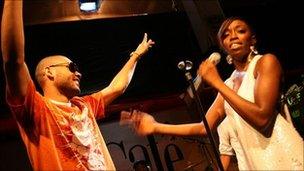Plans to scrap entertainment licences put forward
- Published
- comments

A change in the rules could prove a boost for live music
Pubs, clubs and other small venues offering live music would no longer have to apply for an entertainment licence, under government proposals.
The plans - going out to consultation - would apply to premises in England and Wales with a capacity of under 5,000.
Ministers say the changes could also apply to school and charity events.
Licences would still be required for boxing, wrestling and sexual entertainment, and the rules on alcohol supply and sales would not be affected.
under the is part of its attempt to eliminate red tape.
Punch and Judy
Existing regulations cover venues hosting live and recorded music, which normally have to apply to their local council for a licence, plays, dance, film screenings and indoor sports.
The Department for Culture, Media and Sport said the Licensing Act 2003 removed the so-called two-in-a-bar rule, which had allowed two musicians to perform in a pub without needing an entertainment permit, and this was one example of how it "ended up potentially criminalising a harmless cultural pastime".
"The various musicians' and other performers' unions are extremely concerned that all these obstacles reduce the scope for new talent to get started," it added.
Tourism Minister John Penrose said changes could provide an "important source of new income to struggling businesses such as pubs, restaurants and hotels".
He said extra costs and red tape had also been imposed on school plays and discos where ticket sales went to Parent Teacher Association funds, Punch and Judy shows, street artists, park brass bands and restaurant pianists.
He said current laws had resulted in "inconsistent, illogical and capricious" distinctions between types of events and regulation should be required only where it was needed to keep events safe.
Mr Penrose added: "Before we press ahead, it's important we get the views of those working in the industry, and to make sure that the principles of public safety, prevention of public nuisance and the protection of children from harm are safeguarded.
"Our starting point is a simple one: If there's no good reason for any of the rules and restrictions in this important area, our presumption should be to scrap them."
John Smith, general secretary of the Musicians' Union, welcomed the move.
"At the very least, we hope that the result will be to implement an exemption for small venues putting on live music with fewer than 200 people in attendance, which we have been lobbying for for many years now," he said.
"We therefore also support the proposals outlined in Lord Clement-Jones' Live Music Bill, which state that an exemption to the Licensing Act should take place when 'the live music entertainment takes place in the presence of an audience of no more than 200 persons'."
- Published27 August 2010
- Published22 February 2011